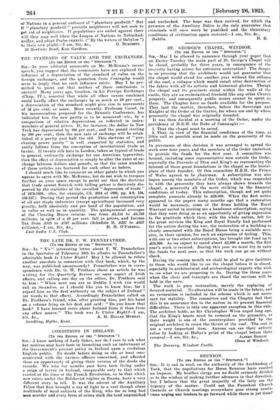ST. GEORGE'S - CHAPEL, WINDSOR.
(To THE EDITOR OP THE " SPECTATOR.")
Sre„—May I be allowed to announce through your paper that on Easter Tuesday the main part of St. George's Chapel will be closed, probably for three years, in consequence of the necessity having arisen for extensive restoration? The danger is so pressing that the architects would not guarantee that the chaptl would stand for another year without the collapse of the roof, a collapse which would entail utter destruction of the fabric with all its artistic and historical glories. Though the chapel and its precincts stand within the walls of the castle, they are an ecclesiastical freehold like any other Church property, and consequently public money cannot be spent on them. The Chapter have no funds available for the purpose. They laid the matter, therefore, before the Sovereign and Knights of the Order of the Garter, for whose use and by whose generosity the chapel was originally founded.
It was then decided at a meeting of the Order, under the presidency of H.B.H. the Duke of Connaught :- 1. That the chapel must be saved.
2. That, in view of the financial conditions of the time, as little call as possible must be made on the generosity, of the public.
In pursuance of this decision it was arranged to spread the work over four years, and the members of the Order undertook to provide the funds for the first year. A committee was formed, including some representative men outside the Order, especially the Provosts of Eton and King's as representing the interest of those great foundations in the chapel as .the burial- place of their founder. Of this committee H.R.H. the Prince. of Wales agreed to be chairman. A subscription was also begun among the members of the Order, which was responded to with the generosity they have always shown towards the chapel, a generosity all the more striking in the financial conditions of to-day. This subscription, though not yet quite complete, amounts already to £20,000. When the first notice appeared in the papers many months ago that a restoration would be necessary, some of the firms holding the Royal Warrant united in sending me a handsome subscription, saying that they were doing so as an opportunity of giving expression to the gratitude which they, with the whole nation, felt for the great services the King and Royal Family had performed for the nation during the war, the restoration of a building so closely associated with the Royal House being a suitable occa- sion, in their opinion, for such an expression of feeling. This, with one or two other subscriptions, has brought the fund up to £25,000. As we expect to spend about £2,000 a month, the first year's work is secured. During this year we must try to raise the funds for next year, so that the work can go on without check.
During the coming month we shall be glad to give facilities to those who would like to see the chapel before it is closed, especially to architectural and archaeological experts who wish to see what we are proposing to do. During the three years when the choir and transepts are closed the services will be held in the nave.
The work is pure restoration, merely the replacing of decayed material. No alteration will be made in the fabric, and no restoration is included in the scheme which is not neces- sary for stability. The committee and the Chapter feel that this is an assurance due to the nation in its present financial difficulties. There is only one apparent• exception to this rale. The architect holds, as Sir Christopher Wren urged long ago, that the King's beasts must be restored on the pinnacles, as their weight is one of the counterpoises provided by the original architect to resist the thrust of the roof. The cost is not a very important item. Anyone can see their artistic value by looking at Holler's print of the chapel before their removal.—I am, Sir, &c., ALBERT BAILLIE The Deanery, Windsor Castle. (Dean of Windsor).


































 Previous page
Previous page